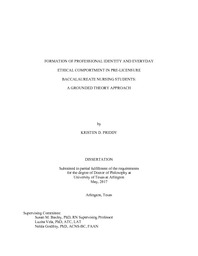
ATTENTION: The works hosted here are being migrated to a new repository that will consolidate resources, improve discoverability, and better show UTA's research impact on the global community. We will update authors as the migration progresses. Please see MavMatrix for more information.
Show simple item record
| dc.contributor.advisor | Baxley, Susan M. | |
| dc.creator | Priddy, Kristen D. | |
| dc.date.accessioned | 2018-03-05T20:43:40Z | |
| dc.date.available | 2018-03-05T20:43:40Z | |
| dc.date.created | 2017-05 | |
| dc.date.submitted | May 2017 | |
| dc.identifier.uri | http://hdl.handle.net/10106/27248 | |
| dc.description.abstract | Formation of professional identity in nursing students is a necessary prerequisite to skilled, ethical, expert nursing practice. Nurses who have not formed an ethical professional identity have a negative impact on the workplace environment and the quality of patient care. These consequences have led educators in medicine and nursing to reconsider the importance of teaching for formation of professional identity and of helping students learn the skills of everyday ethical comportment. Nursing educators lay the foundation for professional nursing identity formation that continues when new graduate nurses enter practice. However, contemporary nursing curricula lack deliberate attention to the formation of profession identity and ethical comportment in nursing students, and there is no theoretical framework that addresses both the process of formation of professional identity and the role of educators in bringing about formation.
In this grounded theory study 12 experienced nursing faculty members from four diverse universities in the southern United States were interviewed about how students change over the course of their nursing education and what education practices support these changes. The resulting grounded theory provides a beginning framework to help nursing faculty members understand their role in educating for formation of professional nursing identity and everyday ethical comportment. Students enter nursing school with individual characteristics that impact their identity formation tasks, and then progress through stages of development in learning to think, feel, and act like nurses. Nursing educators influence the process of forming a professional nursing identity by understanding the student, creating a safe learning environment, providing developmentally appropriate support, and skillfully using appropriate pedagogies. Ongoing development of this grounded theory will continue with additional studies that include the voices of the students and new graduate nurses engaged in the development of identity as professional nurses. | |
| dc.format.mimetype | application/pdf | |
| dc.language.iso | en_US | |
| dc.subject | Professional identity | |
| dc.subject | Nursing students | |
| dc.subject | Ethical comportment | |
| dc.subject | Nursing ethics | |
| dc.title | FORMATION OF PROFESSIONAL IDENTITY AND EVERYDAY ETHICAL COMPORTMENT IN PRE-LICENSURE BACCALAUREATE NURSING STUDENTS: A GROUNDED THEORY APPROACH | |
| dc.type | Thesis | |
| dc.degree.department | Nursing | |
| dc.degree.name | Doctor of Philosophy in Nursing | |
| dc.date.updated | 2018-03-05T20:43:40Z | |
| thesis.degree.department | Nursing | |
| thesis.degree.grantor | The University of Texas at Arlington | |
| thesis.degree.level | Doctoral | |
| thesis.degree.name | Doctor of Philosophy in Nursing | |
| dc.type.material | text | |
| dc.creator.orcid | 0000-0002-1868-133X | |
Files in this item
- Name:
- PRIDDY-DISSERTATION-2017.pdf
- Size:
- 956.5Kb
- Format:
- PDF
This item appears in the following Collection(s)
Show simple item record


